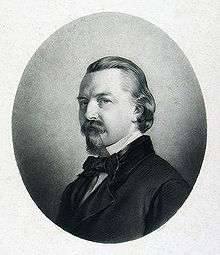Friedrich Wilhelm Kücken
Friedrich Wilhelm Kücken (November 16, 1810 – April 3, 1882) was a German composer and conductor.

Kücken was born in Bleckede. He learned piano as a child and played chamber music in his youth. After moving to Schwerin he studied under Friedrich Lührss, Paul Aron, and George Rettberg. He composed the song Ach, wie wärs möglich dann, which became quite popular and resulted in his being chosen for the court of Grand Duke Paul Friedrich von Mecklenburg-Schwerin.[1] He furthered his studies in 1832 with Joseph Birnbach in Berlin and later with Sechter in Vienna (1841–43), as well as with Halevy and Marco Bordogni in Paris. He held a conducting position at a Stuttgart court theater from 1851 to 1861. He died in Schwerin.
His works included choral pieces, opera, and others.[2] Nikolai Rimsky-Korsakov viewed Kücken's work dimly as "saccharine."[3] His most popular work was the opera Der Prätendent, premiered in Stuttgart in 1847.
Web sources
- Gaynor G. Jones, "Friedrich Wilhelm Kücken". The New Grove Dictionary of Music and Musicians. London:Macmillan, 2001
- The New Harvard Dictionary of Music By Randel, Don Michael
- Reminiscences of Rimsky-Korsakov By Vasilii Vasilʹevich Iastrebtsev, Florence Jonas